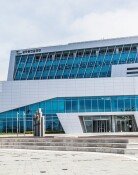'Kim Jong Un trading firms’ in financial crisis
'Kim Jong Un trading firms’ in financial crisis
Posted August. 28, 2017 08:10,
Updated August. 28, 2017 08:41
According to the South China Morning Post in Hong Kong, the amount of products that North Korea exported to China in the second quarter of this year was 385.2 million US dollars. Clothing products amounted to 147.5 million dollars, or 38 percent of the total. Export of fisheries products that were worth 68 million dollars in the quarter has been banned through the latest U.N. Security Council resolution, while export of coal was already halted statistically from the second quarter. As the international community’s sanctions against North Korea get tougher, Pyongyang will become more dependent on its clothing export. They will need experienced textile workers all the more, and Pyongyang will face a situation wherein it can no longer afford to seriously examine whether female workers at the Kaesong Industrial Park are a force that poses potential threat to the Kim Jong Un regime.
If you have a basic understanding about the unique structure of "Supreme leader economy" in North Korea, you can easily imagine the situation of Pyongyang’s leadership that is facing a foreign exchange crisis. It refers to the "favoritism and bribing" exchanged between the supreme leader and power elite, which was established by the late North Korean leader Kim Jong Il. Kim Jong Il gave senior officials of the Workers' Party and the military who are obedient to him the right to collect minerals and fisheries from mines and fishing grounds and export them to China and elsewhere. The power elite pay Kim Jong Il some of the dollars they earn, and use the reminder to manage their organizations. If they lose Kim Jong Il’s trust, they will be deprived of the right, and have no choice to display unchanging loyalty to Kim.
With his mobilized dollars, Kim Jong Il developed nuclear weapons and missiles and managed other power elites by handing lavish gifts. Apparently his son Kim Jong Un placed priority on his father’s leader of Supreme leader economy before anything after assuming power. Some analysts say that Ri Yong Ho, chief of the general staff of the People’s Army who was purged in 2011, and Jang Song Thaek, chief of the party’s administration department who was executed in 2013, might have been disciplined because they were caught while trying to siphon off dollars by hiding some of the rights that had received from Kim Jong Il. The source of dollars was so critical that Kim Jong Un even had to kill his own uncle, Jang.
Experts in the North Korean economy say that the latest U.N. Security Council resolution is different in quality from sanctions of the past. The new measure can practically disrupt the dirty relationship between the supreme leader and power elite that can be maintained only when dollars exchange hands. The U.S. and the international community, which sensed the trend of dollarization of the North Korean economy, completely blocked North Korea from engaging in dollar trade through all banks around the world early this year. China prohibited its companies from investing in North Korea as well.
The North Korean leadership’s recent efforts to find a secret channel to trade dollars seem to be truly desperate. Good examples are money laundering and barter trade through companies in China and Singapore that were revealed in the suit to confiscate 11 million dollars from companies in China and Singapore filed by the U.S. federal attorney last week. The expanses for trade that Pyongyang has to pay are increasing further due to "risk premiums" demanded by its trading partner firms.
Suk-Ho Shin kyle@donga.com
Headline News
- N. Korea launches cyberattacks on S. Korea's defense companies
- Major university hospital professors consider a day off each week
- Italy suffers from fiscal deficits from ‘Super Bonus’ scheme
- Inter Milan secures 20th Serie A title, surpassing AC Milan
- Ruling and opposition prioritize spending amid tax revenue shortfalls







